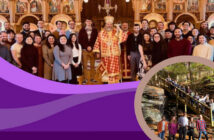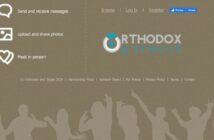![]()
Source: American Orthodox Institute / Touchstone Magazine (May/June 2016)
Eastern Union
The Orthodox Dilemma: Personal Reflections On Global Pan-Orthodox Christian Conciliar Unity
George Alexander
OCP Publications, 2015; 202 pages, $12.00, paperback
By John G. Panagiotou
In George Alexander’s “The Orthodox Dilemma” the reader is given a highly accessible overview of the history, current situation, and possible future of Eastern Orthodoxy and Oriental Orthodoxy. Through personal vignettes and historical illustrations, the writer, himself Oriental Orthodox, seeks to explain and address how the Orthodox Churches have found themselves in their present circumstances.
To those with a relatively undeveloped knowledge of Eastern Christianity, many examples that Alexander cites regarding these churches in both Eastern Orthodox and Oriental Orthodox expression may seem esoteric and obscure, but his central reason for writing the book is plain—to issue a plea for greater Pan-Orthodox unity of witness on a global platform.
He begins by asserting that before any sort of coordinated form of Orthodox Christian witness can be made, the official estrangement and sacramental division between the Eastern Orthodox (Greek, Russian, Serbian, Antiochian, Romanian, and Bulgarian) and the Oriental Orthodox (Coptic, Armenian, Ethiopian, Syriac, and Indian Malankara) needs to be addressed. He makes very compelling arguments that this “Eastern Schism” is the result of linguistic misunderstandings in Christology that have long since been theologically resolved, and he notes that it has been the long-standing pastoral practice that Oriental Orthodox receive the sacraments in Eastern Orthodox Churches. It is high time, the author believes, that official communion should be acknowledged and proclaimed on the hierarchal level.
Nowhere is this point more pointedly made than where he observes that both Eastern Orthodox and Oriental Orthodox bishops and theologians have made great efforts to dialogue and ecumenically interact with the Western Church in both its Roman Catholic and Protestant expressions (in the World Council of Churches and elsewhere) while the Eastern Church has yet to get its own house in order, for which he provides multiple examples from the Council of Chalcedon (a.d. 451) on down to our own time. In the words of the famed Greek Orthodox theologian John S. Romanides, whom he quotes in the book, “The two traditions (Eastern Orthodox and Oriental Orthodox) survived the complexities of history, while always maintaining essentially the same Orthodox Faith.”
The official declaration of reunion of the Eastern Churches would aid much in dealing with the cultural estrangements, prejudices, and suspicions of its members for one another. The irony Alexander notes, however, is that ultimately this needs to be a “grass roots” movement from the bottom to the top, issuing from the laity and the clergy, and facilitated by the hierarchy through better communication and public acknowledgment that the Eastern Orthodox and Oriental Orthodox Churches are sisters.
This, coupled with greater opportunities for interaction between the members of both churches, should be happening throughout Orthodoxy. Concerted efforts along these lines would serve to mitigate prejudices, of which the author provides copious examples. Among the paradigms for reunion that the author cites to demonstrate the achievability of this are the reunification of the Russian Orthodox Church Abroad (aka ROCOR) with the Patriarchate of Moscow in 2007, the Patriarchate of Moscow’s recent outreach to the Old Believers’ Church, and the Pan-Orthodox pioneering work of the Oriental Orthodox theologians Metropolitan Gregorios Paulose and Fr. V. C. Samuel.
It is important to note that Alexander is not calling for a oneworld administrative hierarchical bureaucracy, but rather for an integrated Orthodox Christian witness, which will serve as a platform compatible with the concilliar nature of the Church’s episcopacy. This platform would be an expression of sacramental unity in all of its spiritual aspects of love and shared faith. It is not a call for a single form of worship or administration based on ecclesial jurisdiction, but an incorporation of St. Irenaeus of Lyon’s theme of “unity in diversity.”
The author provides numerous suggestions for realizing a unified Orthodox platform through better theological education for clergy, better use of the modern means of communication and media, and work in social justice ministries. To my knowledge, this is the first published book to provide thoughtful detail on the execution of this vital project. In many ways, it is a seminal work.

John G. Panagiotou is a Greek Orthodox theologian and writer, a graduate of St. Vladimir’s Orthodox Theological Seminary and Wheeling Jesuit University. He can be reached at [email protected].



